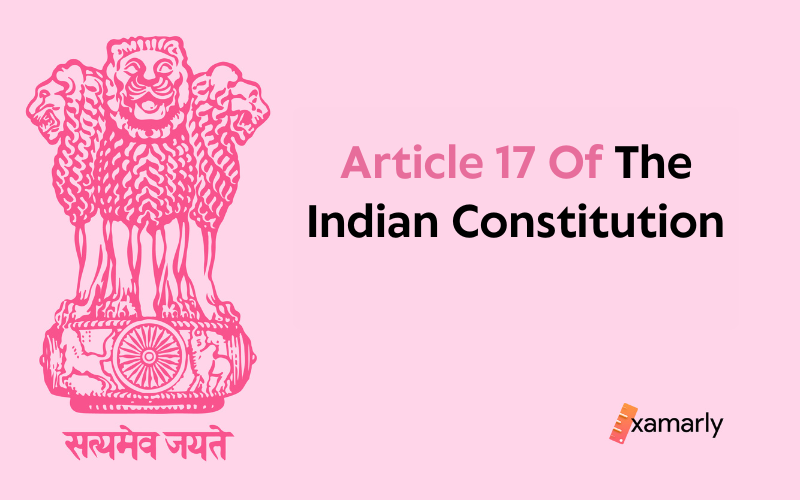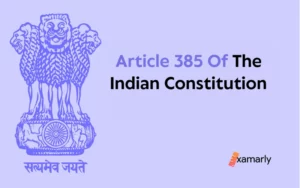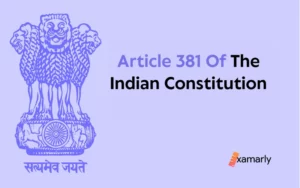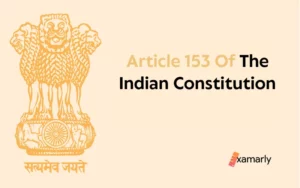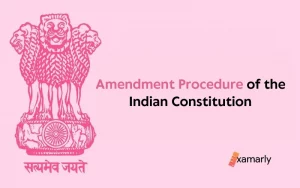Article 17 of the Indian Constitution prohibits untouchability and protects the rights of its victims. The fundamental right shall not be violated by the state. It gives equality of opportunity. This principle is recognized in the Peoples Union for Democratic Rights v UOI case. In the case, the court came to the conclusion that the state must prevent the violation and protect the rights of Indian citizens.
- What Is Untouchability?
- All About Article 17 Of The Indian Constitution
- Some Practices Treated As Untouchability
- Laws To End Untouchability
- The Untouchability Offences Act of 1955
- The Protection Of Civil Liberties Act 1976
- The Protection Of Civil Liberties Act 1976
- The Scheduled Caste And Scheduled Tribe Prevention Of Atrocities Act, 1989
- Some Significant Judgements
- The State Of Karnataka vs Appa Balu Ingale
- People’s Union For Democratic Rights v. Union Of India, AIR 1982
- Safai Karamchari Andolan And Ors. v. Union Of India
- Importance Of Article 17
- Conclusion
- FAQs
What Is Untouchability?
- The definition of Untouchability is that it is a social institution that legitimizes exploitation, discrimination, and humiliation. It is often a form of caste and is a system that excludes women and men from certain social classes. It can be a very divisive system. However, it does not have to be.
- Untouchability was originally a class system in which people of low status were categorized as “untouchable.” These people would work in fields such as farming, mining, and quarrying. They would also perform menial tasks, such as skinning dead animals, cleaning latrines, and unclogging sewers. It is against human dignity.
- Today, untouchability in any sense is illegal in India. The Protection of Civil Rights Act, of 1955, prohibits discrimination on the basis of untouchability in public places. It also prohibits discrimination in public hospitals.
All About Article 17 Of The Indian Constitution
Untouchability is outlawed, and any form of its application is prohibited. Any disability imposed as a result of “Untouchability” is illegal and will be an offence punishable accordingly.
- The Indian Constitution aims to eliminate untouchability.
- Under Article 17 of the Indian Constitution, untouchability is a form of discrimination in society. There should be a prohibition of discrimination against certain people. People from untouchable communities were not allowed to enter temples and were subjected to other restrictions. Several court judgments have confirmed the meaning of untouchability. Moreover, the law has also prohibited discrimination based on caste and faith.
- Article 17 of the Indian Constitution has made untouchability punishable. It has become an important article for social justice and equality before the law, as untouchability has no place in our society.
Some Practices Treated As Untouchability
Some grounds of untouchability have been described as under:
- Directly or indirectly teaching or supporting untouchability.
- Disallowing people from praying at a place of public worship.
- To support or justify untouchability based on custom, and religion.
- Not allowing entry to any public place like stores, hotels, clubs, etc.
- Restricting the supply of public benefit services.
- To hurt the sentiments of a person from a scheduled caste because they are considered untouchables.
- Not to admit people to places of a public good.
- Refusing to sell something to others.
The following articles regarding Indian politics can help candidates prepare for the UPSC exam:
Laws To End Untouchability
The Untouchability Offences Act of 1955
- This will be a criminal offense.
- No apologies are accepted.
- If proven, six months in prison or a fine of 500 rupees, or both, may be levied.
- A candidate will be disqualified from running in the state or Parliamentary elections if proven guilty.
The Protection Of Civil Liberties Act 1976
- This act modified the 1955 Untouchability Offenses Statute.
- The Untouchability (Offenses) Act of 1955 underwent significant revision in 1976. The Protection of Civil Rights Act of 1955 came to be known as it. It aims to broaden the scope and make penal provisions more stringent.
- According to the statute, a civil right is any privilege that a person acquires as a result of untouchability being abolished under Article 17 of the Constitution.
- After charges were proven, the penalty was increased to two years in prison, a fine of Rs. 2000, or both.
The Protection Of Civil Liberties Act 1976
- The untouchability practice in India is intended to be abolished by the Protection of Civil Liberties Act of 1976.
- The law forbids anybody from harassing, abusing, or disparaging an untouchable person.
- Discrimination is also prohibited in public spaces, including hospitals.
- The Act also carries a maximum two-year prison sentence for violations. A violator may also receive a fine and have their license suspended.
- Untouchability is defined in Article 17 of the Indian Constitution as the societal handicaps that were imposed on particular classes of people.
- Some works could be viewed as sacred and punished. The legal system also must include the right to equality.
The Scheduled Caste And Scheduled Tribe Prevention Of Atrocities Act, 1989
- Its main objective is to increase oversight in order to prevent atrocities. Among other things, it seeks to accomplish this by acquiring approvals from upper castes.
- Provides victims with help, counseling, and re-establishment.
- A special court and police forces are created as a result.
- Police can also lend arms to people of the SC and ST communities. This could be helpful for their self-defense.
Some Significant Judgements
The State Of Karnataka vs Appa Balu Ingale
In this case, the respondents were sued because the plaintiff was forcibly denied access to the recently excavated borewell as he hailed to an untouchable group.
The respondent was testified against by four Harijans. In this situation, the stated goal of Article 17 was to rebuild the moral and ethical pillars that society had lost as a result of blindly adhering to ritualistic cultural beliefs.
According to some, this will put Dalits on an equal footing with the general population. Caste and religious discrimination ought to be outlawed.
People’s Union For Democratic Rights v. Union Of India, AIR 1982
In accordance with this Case, the State is required to intervene immediately if a private individual infringes the rights protected by Article 17.
Safai Karamchari Andolan And Ors. v. Union Of India
The petitioners in this case asked the State Governments, Central Government, and Union Territories to implement the Manual Scavengers and Construction of Dry Latrines (Prohibition) Act, 1993. It was done by filing a petition under Article 32.
In this case, the Court issued a number of directives, including:
- Providing rehabilitation for manual scavengers.
- There are scholarships available for scavengers’ offspring.
- Scavengers get one-time financial assistance.
- One person in every household needs to get skill training in order to earn a living.
- They demand additional legal assistance.
- Each death in a sewer gets compensated.
Importance Of Article 17
Untouchability toward lower castes is prohibited by Article 17 of the Indian Constitution. Laws prohibit being untouchable. The article is crucial for establishing equality in Indian society. This article states that anyone who disobeys its directives violates both the constitution’s and citizens’ rights.
Such actions and behaviors are prohibited and illegal under Article 17. It guarantees social justice by putting an end to untouchability. A man’s dignity is maintained through acting honorably and respectfully.
In Article 17, the nation’s democracy is reflected. Apparently, democracy aims toward social equality. Such legal and constitutional protections are essential for a democratic nation. The underprivileged require assurances that they won’t be subjected to the abhorrent and inhumane practice of untouchability.
Conclusion
Article 17 guarantees social justice as well as equality. In India, untouchability in any form is illegal and subject to legal sanctions. Furthermore, it is crucial that the notion of Untouchability not be taken literally. Untouchability should be understood from the perspective of Indian society, though.
FAQs
Is Untouchability Defined In The Indian Constitution?
No, the Indian Constitution does not define untouchability.
What Is The Protection of Civil Liberties Act 1976?
The Protection of Civil Rights Act, a revision of the Untouchability (Offenses) Act, was passed on September 2, 1976. To reduce untouchability, this Act contained harsher measures. Abetment was described as the willful disregard by investigative authorities of accusations of untouchability.
Which Part Of The Indian Constitution Mentions Article 17?
The abolition of untouchability was mentioned under Fundamental Rights. It has been included in Part III of the constitution of India.
Why Is Article 17 So Essential?
Untouchability toward lower castes is prohibited by Article 17 of the Indian Constitution. It is illegal to be untouchable. For equality to be established in Indian society, this article is crucial. Anyone who disobeys its directives violates both the constitution’s and citizens’ rights, according to this article.
What Steps Did Gandhiji Take To Abolish Untouchability?
In an effort to eradicate the idea of “untouchability” from India’s caste system, Gandhi founded the Harijan Sevak Sangh in 1932. He supported practical plans for the Harijans’ development. The Harijan welfare principles were reiterated by him in his speeches at various public events.


